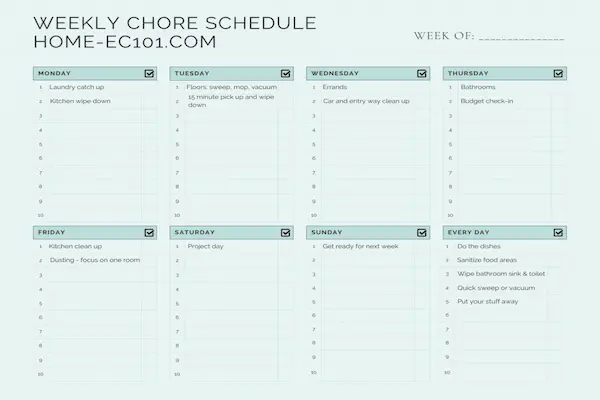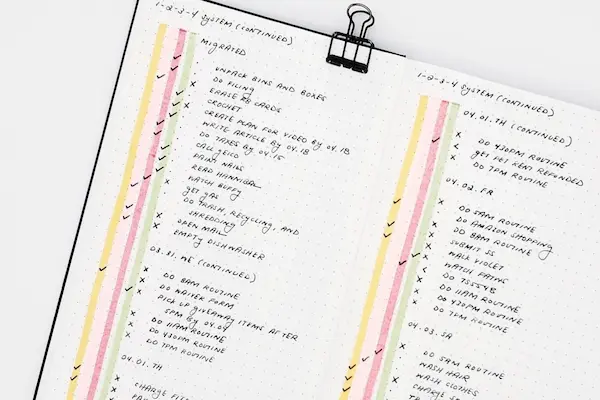Weekends should feel like a breath of fresh air, not a frantic race against time to catch up on everything you couldn’t do during the week.
Yet for millions of people, Saturday and Sunday become overwhelming marathons of laundry, cleaning, errands, and household tasks that leave them feeling more exhausted than refreshed.
Sound familiar?
The truth is, you don’t have to choose between having a clean, organized home and enjoying your precious weekend time.
Learning how to plan weekend chores effectively can transform your days off from chaotic catch-up sessions into balanced, productive periods that leave you feeling accomplished and relaxed.
When you master the art of weekend chore planning, you’re not just organizing tasks – you’re reclaiming your time, reducing stress, and creating space for the activities and relationships that truly matter to you.
In this comprehensive guide, we’ll walk you through proven strategies, practical systems, and expert techniques that will revolutionize how you approach weekend productivity while preserving time for rest and enjoyment.

Why Learning How to Plan Weekend Chores Changes Everything
Most people approach weekend chores with the same strategy they use for weekday emergencies – reactively tackling whatever seems most urgent in the moment.
This scattered approach leads to half-finished projects, forgotten important tasks, and that nagging feeling that you’re always behind on household management.
When you develop a systematic approach to weekend chore planning, you’re creating a framework that eliminates decision fatigue and maximizes your efficiency.
Research from productivity experts shows that people who plan their weekend activities in advance report 45% less stress and complete 60% more of their intended tasks (source: Calendar.com).
Professional organizers and time management specialists consistently emphasize that successful weekend planning isn’t about cramming more tasks into your days off.
Instead, it’s about creating intentional balance between necessary maintenance tasks and restorative activities that prepare you for the week ahead.
The key lies in understanding that weekends serve dual purposes: they’re opportunities to maintain your living space and lifestyle, while also providing essential rest and rejuvenation time.
Understanding the Psychology of Weekend Productivity
Before diving into specific planning strategies, it’s crucial to understand why weekends feel different from weekdays and how this affects our approach to chores and productivity.
Weekends represent freedom from external schedules and obligations, which can be both liberating and overwhelming when it comes to managing household tasks.
Without the structure of work schedules, many people struggle to create effective rhythms for accomplishing necessary chores while still enjoying their time off.
The psychological shift from weekday efficiency to weekend relaxation mode can make it challenging to maintain momentum on important tasks.
However, this same mental shift also provides opportunities for more creative, flexible approaches to household management that wouldn’t work during busy weekdays.
Understanding your personal energy patterns throughout the weekend helps you align challenging tasks with your peak performance times while reserving low-energy periods for rest or lighter activities.
Many successful weekend planners discover that they feel more relaxed and truly enjoy their downtime when they know important tasks are handled efficiently.
The Foundation: How to Plan Weekend Chores That Actually Work
Effective weekend chore planning starts with a comprehensive assessment of what actually needs to be accomplished and when it makes sense to do each task.
Begin by creating a master list of all household tasks, maintenance items, and personal errands that typically need attention during weekends.
This might seem overwhelming initially, but having everything visible allows you to make strategic decisions about timing, priority, and delegation.
Categorize your tasks into four main groups: essential weekly tasks, periodic maintenance, seasonal projects, and flexible errands that can be moved if needed.
Essential weekly tasks include things like laundry, grocery shopping, and basic cleaning that must happen regularly to maintain household function.
Periodic maintenance covers items like deep cleaning, yard work, and organization projects that need attention less frequently but can’t be ignored indefinitely.
Seasonal projects encompass larger undertakings like closet organization, home repairs, or garden maintenance that align with specific times of year.
Flexible errands include things like returns, non-urgent shopping, and social obligations that can be rescheduled without major consequences.
Time Blocking Strategies for Weekend Chore Management
Time blocking transforms abstract to-do lists into concrete, actionable schedules that respect both your productivity needs and your desire for weekend enjoyment.
The most effective approach involves creating dedicated blocks of time for different types of activities rather than randomly scattering chores throughout your weekend (source: Home Sweet Work Life).
Start by identifying your peak energy periods during weekends – many people find they’re most motivated and efficient during late morning hours on Saturday.
Reserve these high-energy blocks for your most challenging or important tasks, such as deep cleaning, organizing projects, or physically demanding chores.
Create transition periods between intensive chore blocks and leisure activities to avoid the jarring shift from work mode to relaxation mode.
These 15-30 minute buffers allow you to clean up, change clothes, or simply decompress before moving into enjoyment activities.
Consider implementing themed time blocks, such as “Saturday morning home maintenance,” “Saturday afternoon errands,” and “Sunday morning meal prep.”
This approach creates predictable routines that reduce decision-making while ensuring all important areas receive attention.
Morning Routines That Set Up Weekend Success
How you start your weekend mornings significantly impacts your ability to accomplish chores efficiently while maintaining a positive, relaxed mindset.
Successful weekend planners often begin Saturday with a brief planning session over coffee, reviewing their prepared list and making any necessary adjustments based on weather, energy levels, or schedule changes.
This planning time shouldn’t exceed 10-15 minutes, but it provides crucial mental preparation and helps you approach tasks with intention rather than overwhelm.
Consider starting with one small, satisfying task that provides immediate visual results – making beds, loading the dishwasher, or tidying the main living area.
These quick wins create psychological momentum and make the entire space feel more organized, which can motivate you to tackle larger projects.
Many productivity experts recommend completing at least one significant chore before allowing yourself leisure activities like social media, television, or extended breakfast routines.
This “eat the frog” approach ensures that important tasks get done even if the day takes unexpected turns.
How to Plan Weekend Chores Around Family Schedules
Family households require more complex weekend chore planning that accounts for multiple schedules, varying energy levels, and the need to model good habits for children.
Start by involving family members in both the planning process and the execution of household tasks, creating shared ownership of the home environment.
Children as young as 3-4 years old can contribute to household maintenance through age-appropriate tasks that teach responsibility while lightening the overall workload.
Create visual schedules or chore charts that help family members understand expectations and track progress throughout the weekend.
Plan chores that can be done together, such as yard work, organizing common areas, or meal preparation, which builds family connection while accomplishing necessary tasks.
Balance individual chore time with family activity time, ensuring that household maintenance doesn’t consume all your shared weekend hours.
Consider rotating responsibilities weekly or monthly to prevent any one person from feeling burdened by the same tasks repeatedly.
Communication becomes crucial in family chore planning – hold brief family meetings to discuss weekend priorities and ensure everyone understands their role in maintaining the household.
Seasonal Considerations for Weekend Chore Planning
Different seasons bring unique challenges and opportunities that should influence how you plan weekend chores throughout the year.
Spring weekends often focus on deep cleaning, decluttering, and outdoor preparation as you emerge from winter’s indoor lifestyle.
This is an ideal time for organizing closets, washing windows, and tackling maintenance projects that were postponed during colder months.
Summer weekend planning should account for higher energy costs, increased outdoor time, and vacation schedules that might disrupt normal routines.
Focus on early morning or evening chore sessions to avoid the heat, and prioritize tasks that maintain cooling systems and outdoor spaces.
Fall brings preparation tasks for colder weather, including winterizing outdoor equipment, deep cleaning before holiday seasons, and organizing summer items for storage.
Winter weekend chore planning often shifts indoors, focusing on organization projects, holiday preparation, and maintenance of heating systems.
Each season also offers unique opportunities for batch processing – spring cleaning sessions, summer preserve-making, fall decorating, and winter organizing projects.
Creating Flexible Systems That Adapt to Changing Needs
The most successful weekend chore planning systems are flexible enough to adapt to changing circumstances without completely falling apart.
Build buffer time into your weekend schedule to account for tasks that take longer than expected or unexpected priorities that arise.
Develop “minimum viable weekend” lists that identify the absolute essentials that must be completed, regardless of other circumstances.
These abbreviated lists become lifesavers during particularly busy weekends, illness, or when unexpected opportunities arise.
Create modular task groupings that can be moved between weekends as needed – if you can’t tackle bathroom deep cleaning this weekend, it can shift to next weekend without disrupting your entire system.
Consider developing different planning templates for various types of weekends: normal weekends, holiday weekends, guests-are-coming weekends, and recovery weekends after busy periods.
Technology and Tools for Effective Weekend Chore Planning
Modern technology offers numerous tools that can streamline your weekend chore planning and execution processes.
Digital planning apps allow you to create recurring task lists, set reminders, and track completion over time (source: The Incremental Mama).
Many people find success with simple smartphone apps that let them quickly add tasks as they think of them throughout the week, building comprehensive weekend lists without forgetting important items.
Timer apps help you stay focused during chore sessions while preventing tasks from expanding to fill more time than necessary.
The Pomodoro Technique – working in focused 25-minute blocks with short breaks – can be particularly effective for weekend cleaning and organizing projects.
Smart home technology can automate some household tasks, such as vacuum robots that clean floors while you focus on other activities.
Consider using shared family calendars and task management apps that allow household members to see what needs to be done and claim responsibility for specific items.
Meal Planning and Prep as Weekend Chore Cornerstones
Food-related tasks often consume significant weekend time, but strategic meal planning and prep can streamline these activities while setting you up for weekday success.
Dedicate specific time blocks to meal planning, grocery shopping, and food preparation rather than handling these tasks reactively throughout the weekend.
Batch cooking and meal prep sessions can eliminate weekday cooking stress while making efficient use of weekend kitchen time.
Plan meals that use similar ingredients to minimize grocery shopping complexity and reduce food waste.
Consider theme nights or rotation systems that eliminate weekly meal-planning decisions – Taco Tuesday, Pasta Thursday, Pizza Friday create predictable structures that simplify planning.
Involve family members in meal prep activities, teaching cooking skills while accomplishing necessary food preparation.
Stock freezer meals and backup options during weekend prep sessions to handle busy weekday evenings without stress.
How to Plan Weekend Chores Without Sacrificing Rest and Enjoyment
The ultimate goal of weekend chore planning is creating more time and mental space for rest, relationships, and activities you truly enjoy.
Successful planners recognize that rest and enjoyment aren’t luxuries to be earned after all chores are complete – they’re essential components of sustainable weekend routines.
Build relaxation and fun activities into your weekend schedule with the same intentionality you apply to chore planning (source: Calendar.com).
This might mean scheduling afternoon naps, planning coffee dates with friends, or blocking time for hobbies that recharge your energy.
Practice the “good enough” principle for many household tasks – not everything needs to be perfect, and pursuing perfection often prevents you from enjoying your weekend.
Set boundaries around chore time by establishing clear start and stop times, preventing household tasks from expanding to consume your entire weekend.
Create rewards and incentives that make chore completion more enjoyable – playing upbeat music, planning special meals, or scheduling enjoyable activities immediately after task completion.
Advanced Strategies: Batch Processing and Efficiency Hacks
Once you’ve mastered basic weekend chore planning, advanced strategies can further optimize your efficiency and effectiveness.
Batch processing involves grouping similar tasks together to minimize setup time and maximize focus – doing all laundry tasks at once, handling all errands in one trip, or tackling all bathroom cleaning simultaneously.
Create “zones” in your home and dedicate specific time blocks to each area rather than bouncing between different rooms randomly throughout the weekend.
Develop standard operating procedures for recurring tasks, creating step-by-step processes that eliminate decision-making and ensure consistent results.
Use the “one-touch rule” for items like mail, paperwork, and household items – handle each thing once rather than moving it multiple times before dealing with it properly.
Implement the “15-minute rule” for small tasks that tend to accumulate – set a timer and tackle quick organizing, cleaning, or maintenance items that prevent larger problems from developing.





